Front, not back cameras, will be the new big smartphone trend
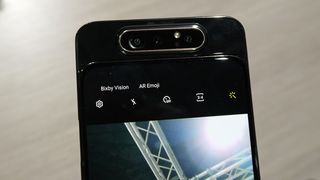
The recently-launched Samsung Galaxy A80 boasts a novel feature: three cameras in a slide-up panel which could rotate to face either the front or back.
Tri-cam rear setups are nothing new, with recent phones like the Huawei P30 Pro packing four snappers, but the Galaxy A80’s 'wow factor' was that its three cameras could spin around to the front and take selfies. We hadn’t seen a front-facing loadout with three cameras before, and weren’t sure how useful they’d be.
But with the news that both LG and Xiaomi could be working on handsets with three front-facing cameras, it seems that some companies are making bigger tech leaps in their front – not rear – cameras, which marks a change from what we usually see. That raises the question: are we going to see phonemakers pivot their focus from rear-mounted cameras to front-facing snappers?
?Why three cameras
The three cameras on the Samsung Galaxy A80 are a powerful main snapper joined by a 3D depth sensor and a camera with an ultra-wide lens.
The first two of these can be used to take great solo selfies – by sensing depth the main camera can take pictures with the perfect level of background blur. The latter camera is better at taking selfies with a larger frame, so if you’ve got a load of friends or are in a very scenic location you can capture a much wider field of view.
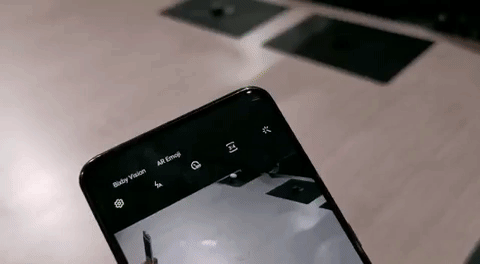
The Samsung Galaxy A80. Image credit: TechRadar
It’s likely other companies would pack snappers with roughly comparable roles in phones with three front facing cameras, as the Galaxy A80’s suite covers all the bases you’d need. Selfies taken with a setup like this could be second to none (although the specific post-processing processes play some part too, and an overabundance of filters of course).
Unlike rear-facing loadouts, you don’t need a flash for a front-facing camera on a phone. Many devices nowadays, like the Huawei P30, briefly illuminate the entire front screen in bright white to simulate a flash-effect in a dark environment.
?Who actually needs great selfies
Not all smartphone users need breathtaking selfies. But then again most smartphone users don’t need quad-camera loadouts, super-fast processors or monumental battery lives, so the question of “who needs” any kind of luxury in a phone is a moot point.
There would be a large audience who’d find the functions of the three cameras useful, however – as much as some try to deny it, selfies are one of the most common ways people use their smartphones, to record a moment or mood whether or not the picture is destined for social media.
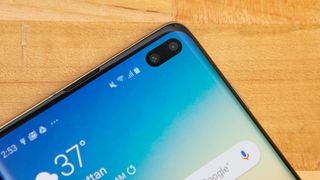
The Samsung Galaxy S10 Plus. Image credit: TechRadar
Selfies are used to create or define identity, and if a front-facing camera can give users different tools to hone a picture, it’ll therefore give them more ways to represent themselves.
The ultra-wide lens in particular may be useful to a lot of people. Imagine hiking to the top of a mountain, and taking a selfie to prove it, only for the narrow field of view to cut out the best sights. Or having a gathering of a lot of friends, and not being able to take a picture with all of them. An ultra-wide lens would solve these problems.
?What could it mean for smartphones
The Samsung Galaxy A80 has its front-facing cameras positioned on a rotating block as part of a pop-up rear panel – that’s a lot of moving parts that need to survive countless uses, and it looks like the aforementioned Xiaomi patent make take inspiration from this, in part at least.
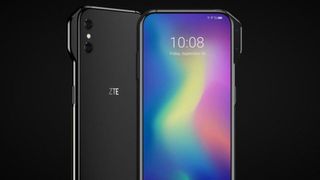
The Axon V. Image credit: Axon
This abundance of moving parts could bring interesting changes to one subsect of mobile phones right now – foldables. The Samsung Galaxy Fold has a durability problem, mostly because of its various mechanical elements, but pop-up camera sections like in the Galaxy A80 and future Xiaomi phone could prove a useful ‘baby steps first’ approach to moving parts in smartphones.
Another trend in smartphones is a reduction in phone screen complications to try and make a perfect unbroken screen – that’s why the Galaxy A80 has a pop-up section instead of a notch to house the cameras, and many other smartphone companies are trying to find places to put the camera and speaker that aren’t in a notch.
If the trends of unbroken screens and more front-facing cameras are going to peacefully coexist, companies are going to need to find ways to innovate where they place their front-facing cameras. The LG patent shows a notch that houses three snappers...and it’s big and ugly, like a device from several years ago. There have got to be better ways to hide the cameras.
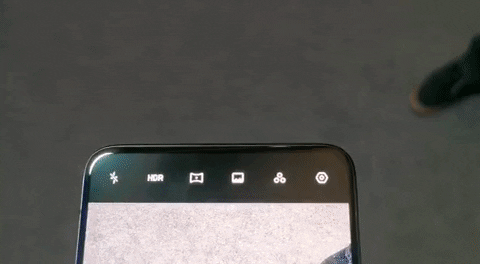
The Oppo Reno 10x Zoom edition Image credit: TechRadar
Whether this means housing cameras in entire rotating sections like in the Galaxy A80, putting them in a slide-up shelf like the Oppo Find X, or cramming them in a smaller pop-up ear like what we’re expecting to see in the OnePlus 7, companies are going to have to find their own ways to innovate.
We’ve already seen some intriguing new ideas for front-facing cameras in patents and launched products. The Axon V could have its cameras mounted on a ‘wing’ to the side of the device, while the Oppo Reno has a pop-up ‘shark-fin’ that opens when you need to take a shot. A Xiaomi patent shows a selfie-cam at the bottom of the display, not the top, and a patent from Google, possibly for the Pixel 4, doesn’t have any apparent front snappers at all.
This all goes to show that front facing cameras are one of the most exciting ways different companies differentiate their phones from each other, and compared to aspects like cameras, screens, or processing speeds, which can often be rather similar on competitive devices, selfie-snappers are a field in which there’s still some zany ideas to be had.

Comments
Post a Comment